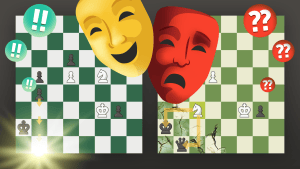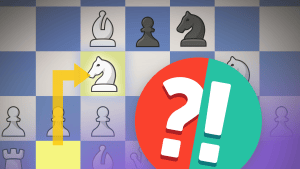To Err is Human, Part 3
In the previous two parts of this series, we have already established the fact that you really need to analyze your games in order to find your mistakes so you'll never repeat them again. Unfortunately, you don't always realize the true reason for your defeat. Let me show you my own old game which I played in the qualification tournament which was supposed to determine the Soviet participant of the coming World Junior Championship. My opponent was a talented master (future GM) Ilya Smirin:
Now, please replay the game from the beginning and try to determine why I lost the game.
Done? Now let's compare your findings and mine. I blamed myself for missing a primitive combination. Of course after that I could still fight by accepting the sacrifice, but the major damage was already done. Is that what you thought as well?
The next year I was invited to attend the famous Botvinnik-Kasparov school, where amongst all the exciting things we played a clock simul against Kasparov. Unfortunately, I managed to lose the complete score of the game (don't ask how I could be so careless, it is a really long story); all I remember is the opening because it made a strong impression on me.
So, as you could see, we repeated the moves and as far as I remember we did it more than the 3 times required to claim a draw. Neither opponent claimed the draw though, so the game continued and I duly lost it. It is understandable that Kasparov would never claim a draw, but why did he accept a chance that I could claim it and why didn't I? I asked Kasparov these questions after the game. He laughed and said that he used this trick in simuls against masters many times and so far none of his opponents claimed a draw.
Why? The short answer is pride. You are a master playing White in a clock simul and have a theoretical position which is good for you and you know it. Now, wouldn't you consider yourself a coward if you took a draw in such a situation? On the other hand, by refusing a draw you are saying: "Look , you may be the World Champion, but I am not a patzer either!" and doesn't it feel good? So by refusing a draw you take a risk without actually taking a big risk because you know that your position is good. If it was a middlegame and the position was unclear Kasparov said he wouldn't bluff, because his opponent would probably accept a draw since there is a big risk to fight Kasparov in an unclear situation.
It was a revelation to me! Kasparov practically read my mind. I immediately remembered the game against Smirin and realized that I fell for the same trick without even knowing it! When we started the repetition of the moves in that game I had an extra pawn. I knew that he had a decent compensation for the pawn and in the sharp middlegame position the extra pawn wasn't that important. And yet this extra pawn didn't allow me to accept a draw, just like I didn't except a draw against Kasparov in the theoretical position which was supposedly better for White because I would consider myself a coward. Also the extra pawn against Smirin gave me the same false sense of security and just like against Kasparov, I took a risk without taking a big risk, or at least I thought that way. Boy, was I punished in both games! The lesson was learned and the next year, when I played the next qualification tournament which was supposed to determine the Soviet participant of the coming World Junior Championship, I used Kasparov's trick myself!
This game definitely helped me to win the tournament, but most importantly confirmed the learned lesson: "Refusing a draw doesn't automatically make you brave just like accepting a draw doesn't make you a coward!"
In the next game the effect of this little trick was much bigger than I could imagine:
As you noticed we started repeating the moves and I would really hate it if my opponent claimed a draw because I really liked my position. But as I already learned, the risk was very small since Shirov's rating was about 150 points higher than mine and besides his position looked OK, so by refusing a draw he wouldn't take a big risk. Unfortunately, by refusing a draw Black made serious concessions, which lead to an inferior position and the ultimate blunder. As you all know, GM Alexey Shirov is a brilliant tactician, so I really doubt that under normal circumstances he would blunder like this. But that's exactly what I did in the game against Smirin!
As you could see, the biggest mistakes are made not on the chessboard sometimes but in the player's head!
to be continued...

